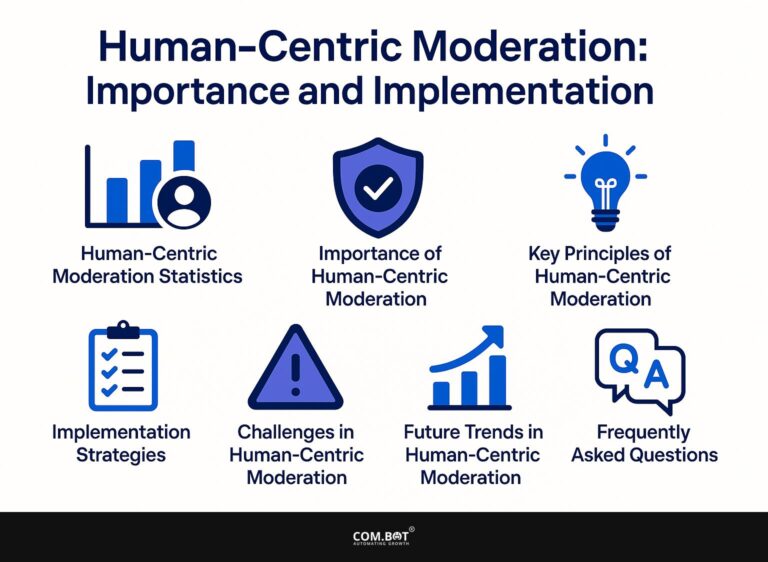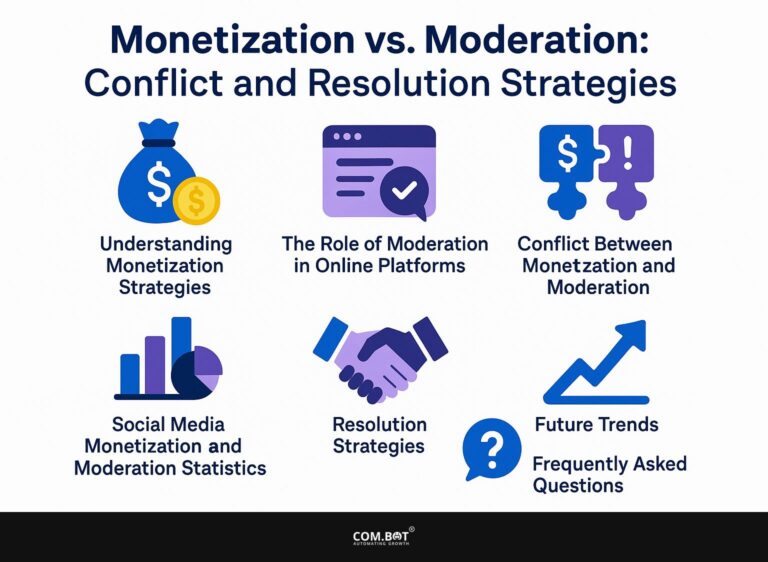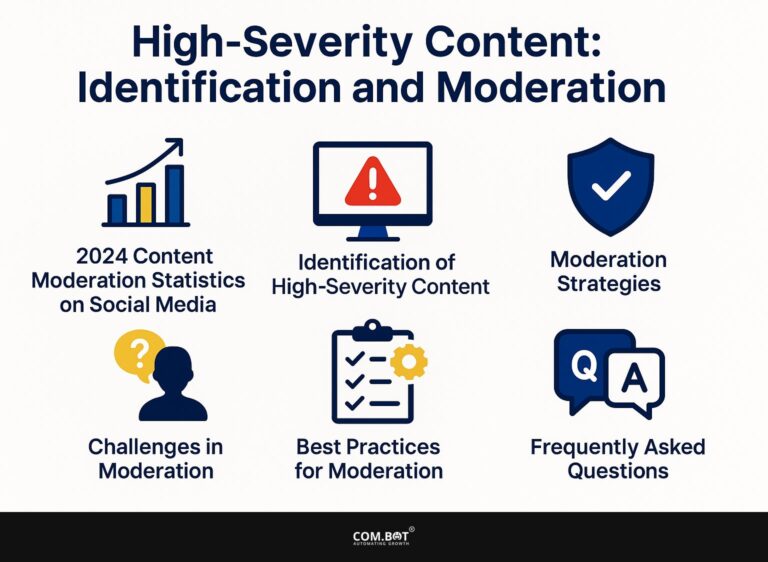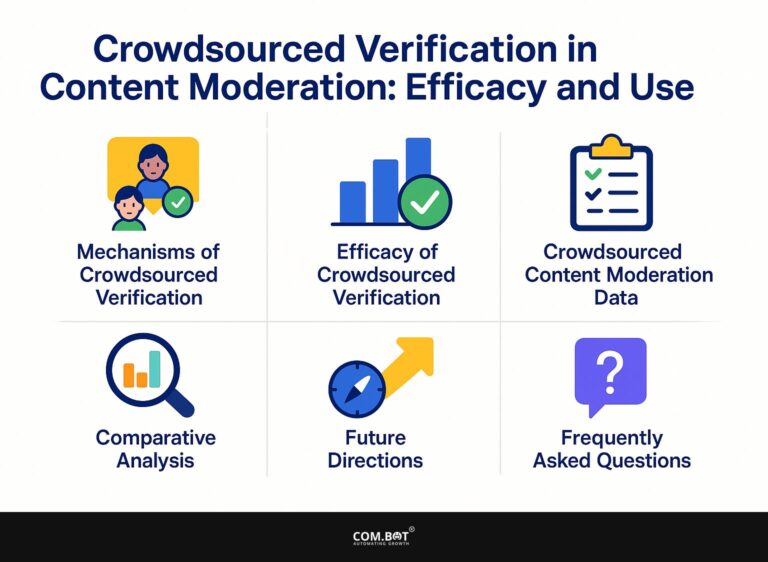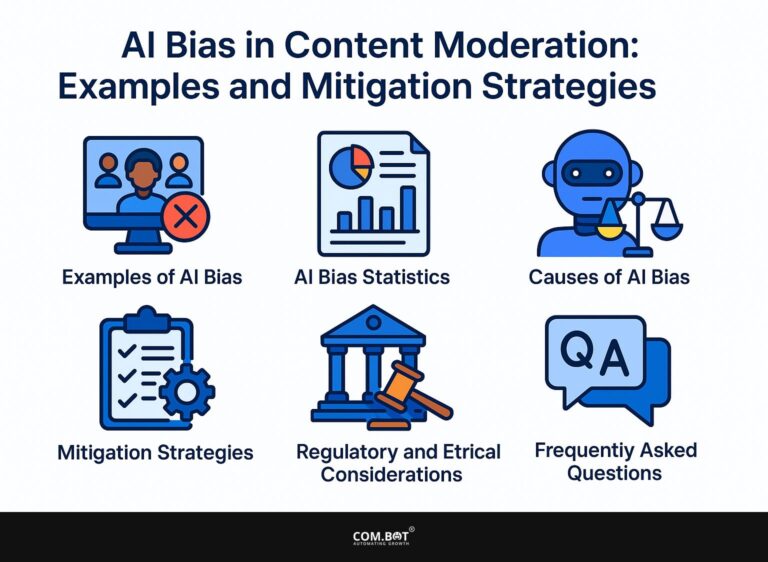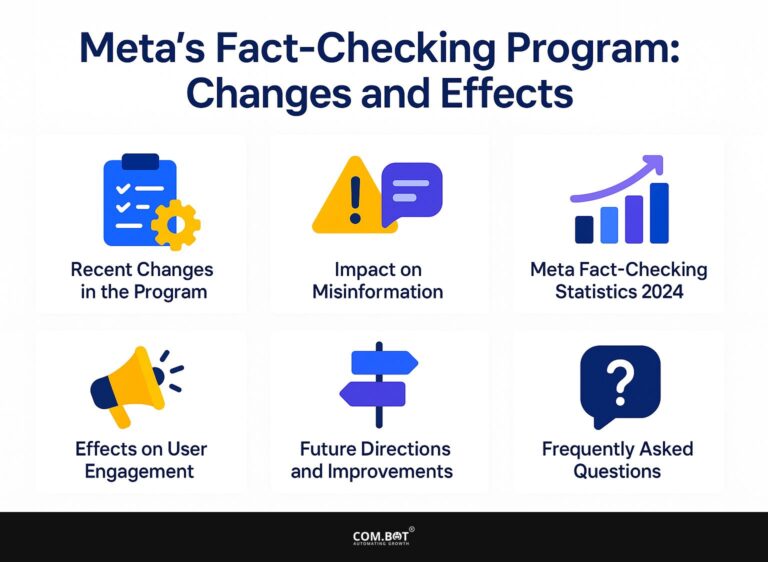Impact of State-Level Privacy Regulations on Social Media Content Moderation
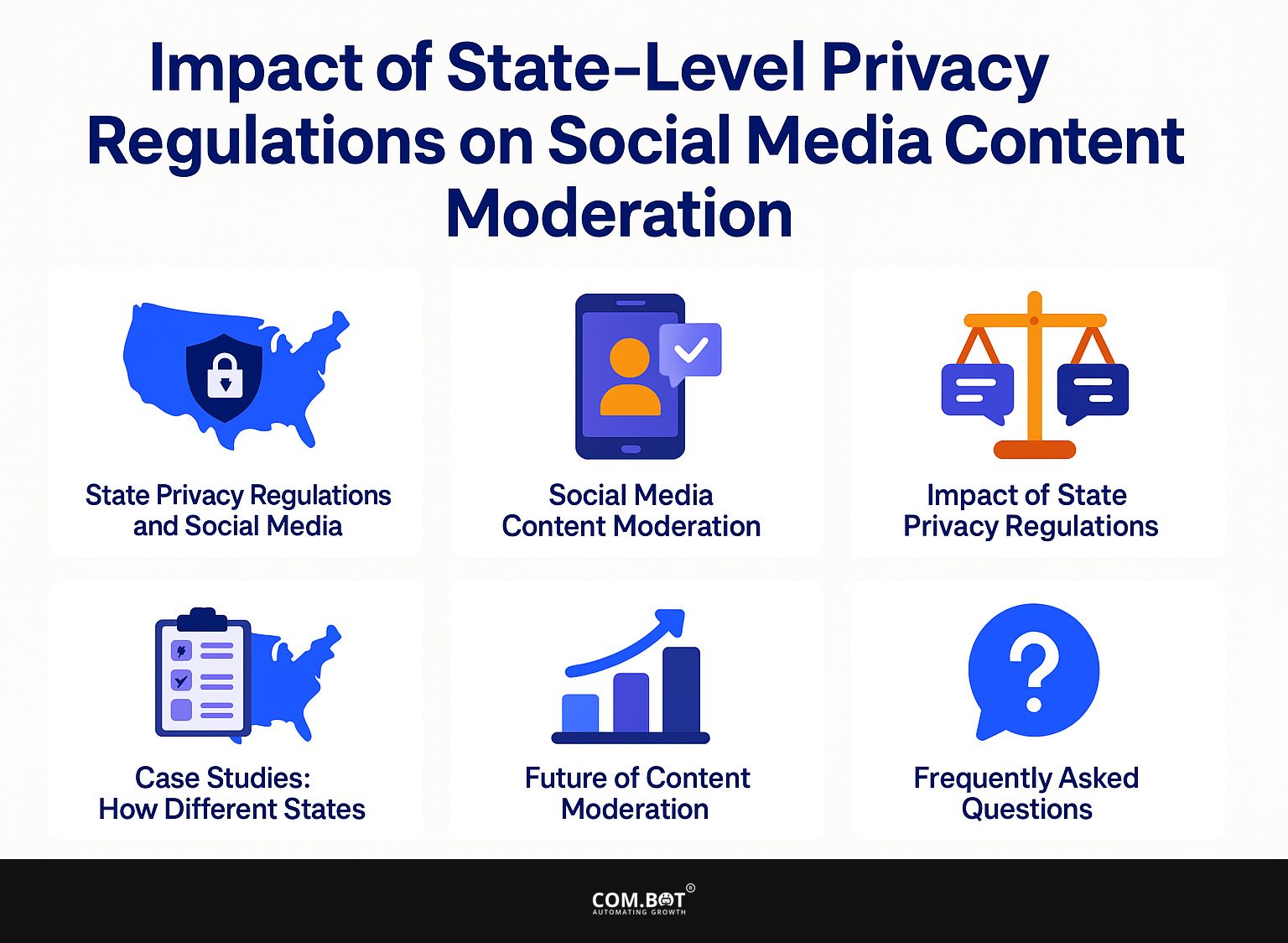
State-level privacy regulations are becoming more important in the digital world. pivotal role in shaping how social media platforms moderate content.
Understanding the intersection of these privacy laws and content moderation practices is key for managing the challenging world of online communication. This article explores the definition and significance of social media content moderation, the challenges posed by varying state regulations, and real-world case studies that illustrate diverse approaches.
It also looks ahead to the future of content moderation Due to changes in privacy rules, giving guidance and suggestions to help stakeholders adjust to these changes dynamic regulatory landscape.
Key Takeaways:
- State-level privacy laws pose challenges for social media companies in enforcing content moderation policies.
- Staying within state privacy laws means consistently checking and changing how content is reviewed.
- Content moderation will need to carefully balance safeguarding user privacy while ensuring the internet remains safe and healthy.
- 1 State Privacy Regulations and Social Media 2024 Statistics
- 2 Social Media Content Moderation
- 3 Impact of State Privacy Regulations on Content Moderation
- 4 Case Studies: How Different States Handle Privacy Regulations and Content Moderation
- 5 Content Moderation and State Privacy Laws
- 6 Frequently Asked Questions
- 6.1 1. What are state-level privacy regulations and how do they impact social media content moderation?
- 6.2 2. Do all states have their own privacy regulations and how does this affect social media platforms?
- 6.3 3. How do state-level privacy regulations affect the way social media platforms collect and use user data?
- 6.4 4. Can state-level privacy regulations affect the way social media platforms handle user data from different countries?
- 6.5 5. What are the potential consequences for social media platforms that do not comply with state-level privacy regulations?
- 6.6 6. How can social media platforms effectively balance compliance with state-level privacy regulations and content moderation responsibilities?
Overview of State Privacy Laws
State privacy laws in the United States have changed quickly due to increasing worries about consumer privacy, limiting data collection, and the activities of data brokers.
Each state, including California and Texas, has introduced various privacy regulations aimed at addressing these issues, with an eye towards enhancing online safety and protecting personal data.
For businesses operating in this environment, employing tools like a GDPR & CCPA compliant bot can help manage compliance effectively. The legislative focus on privacy laws is likely to grow as the 2025 state laws deadline approaches, leading many to think about the upcoming regulatory issues.
California is notable for its strong Consumer Privacy Act (CCPA), which provides people with important rights like accessing their data and having it deleted.
In contrast, Texas has adopted a more business-friendly approach with its Texas Privacy Protection Act, focusing on transparency and consumer opt-out mechanisms. These different ideas show how privacy rules change from state to state and affect businesses by increasing compliance costs and requiring changes in operations.
Consumer advocates are keeping an eye on these changes, stressing the importance of strong safeguards against data misuse in a constantly changing privacy system. This system mirrors the different opinions on personal data management seen across the country.
State Privacy Regulations and Social Media 2024 Statistics
State Privacy Regulations and Social Media 2024 Statistics
State Privacy Legislation Overview: Enacted Privacy Laws
State Privacy Legislation Overview: Detailed Privacy Rules
State Privacy Legislation Overview: Legislative Timelines
The State Privacy Regulations and Social Media 2024 Statistics shows the changing privacy laws across the United States. This data gives a detailed look at privacy regulations, pointing out important laws and rules that safeguard consumer data.
State Privacy Legislation Overview indicates that 20 states have enacted privacy laws, showcasing widespread recognition of the need to protect consumer information. California stands out with its CCPA and CPRA Laws that set thorough rules for data privacy. Since 2023, 6 comprehensive laws have been put in place, showing an increasing move towards stronger privacy measures.
- The Comprehensive Privacy Provisions detail that 11 states allow consumers to opt-out of gathering information, giving people control over their own data. Only 1 state includes biometric data provisions, indicating a nascent focus on more sensitive data types. Each state covers at least 100,000 consumers, emphasizing the scale at which these laws operate.
Legislative Timelines provide a historical overview and predictions for the development of privacy laws. The first significant law, effective in California in 2020, set a precedent for other states to follow. The most recent enactment in Rhode Island is anticipated by 2026, showcasing ongoing legislative momentum. Meanwhile, Colorado’s opt-out implementation in 2024 shows ongoing efforts to improve consumer privacy rights.
In summary, the State Privacy Regulations and Social Media 2024 Statistics show a changing legal environment focusing on protecting consumer data As more states create detailed privacy laws, the emphasis on giving consumers control and protecting important information will keep influencing privacy rules in the United States.
Social Media Content Moderation
Social media content moderation is now very important for keeping online spaces safe, especially as platforms like Facebook and Twitter deal with First Amendment issues and regulatory challenges.
Artificial intelligence is altering how content is managed and impacting marketing strategies, prompting social media companies to adjust to new privacy expectations and legal requirements for users. For an extensive analysis of this trend, our comprehensive study of Meta AI’s role in content moderation offers valuable insights into current tools and limitations.
Definition and Importance
Content moderation is the process where user content is checked and controlled to meet platform guidelines, legal standards, and online safety rules. This practice is important for keeping consumer privacy safe and ensuring a secure online environment, particularly because more states are introducing stricter regulations.
There are important types of content moderation:
- automated filtering
- human review
- community reporting systems
Each one helps protect users in different ways.
Automated systems quickly find and label inappropriate content, while human moderators provide thorough review. Community-driven methods let users report harmful actions, encouraging responsibility among platform users.
Together, these methods improve user experiences and meet legal requirements, highlighting the need for a safe online environment where privacy is valued and maintained.
Impact of State Privacy Regulations on Content Moderation
State privacy laws are important in managing content on digital platforms, setting new guidelines for how companies handle content made by users.
This changing situation offers both possibilities and difficulties for social media platforms as they work around different state privacy laws while following rules and keeping users’ trust. If interested in how these challenges impact communication, explore our insights on Com.bot Academic Communication.
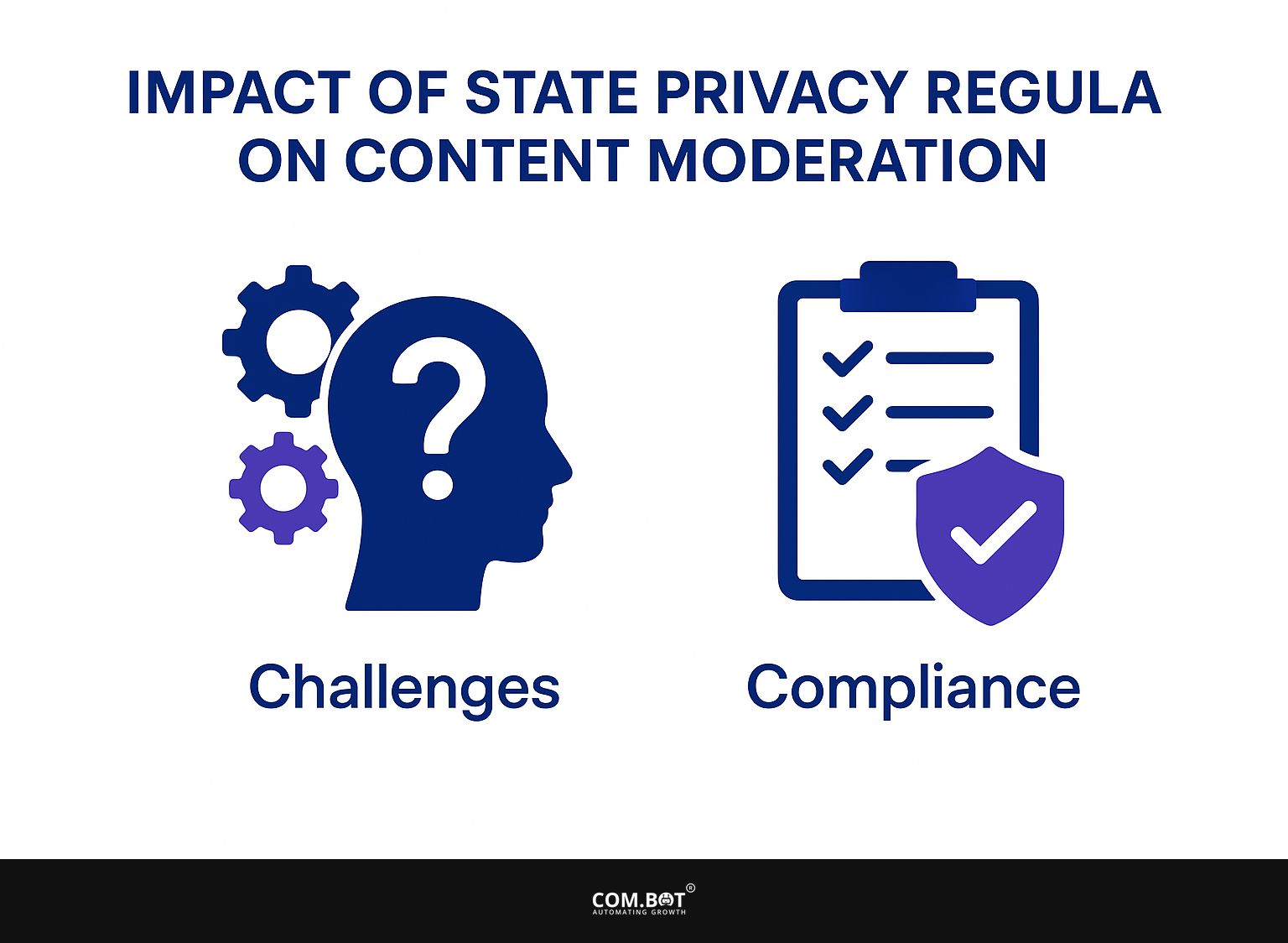
Challenges and Compliance Issues
State privacy regulations present challenges and compliance issues for businesses, as they must deal with complex laws and properly safeguard consumer data. These regulatory challenges become more difficult because data brokers gather and sell personal information, requiring strong compliance strategies to reduce risks and follow privacy rules.
Knowing the various compliance rules for each state, which can differ significantly, is often necessary to manage these issues.
To create successful compliance systems, organizations need to find and reduce possible risks and set up procedures for continuous checking and assessment to maintain long-term compliance.
When companies don’t follow regulations, they can face big fines and damage to their reputation, so it’s important for them to pay attention to compliance.
In this changing environment, it is important for organizations to focus on being open and responsible by actively managing their data practices.
Case Studies: How Different States Handle Privacy Regulations and Content Moderation
Looking at examples from states like California, Virginia, and Texas shows different ways they handle privacy rules. Each state has its own way of managing content moderation and protecting consumers.
These rules show the specific problems each state deals with and how they work to follow the law while keeping personal data secure and ensuring online safety.
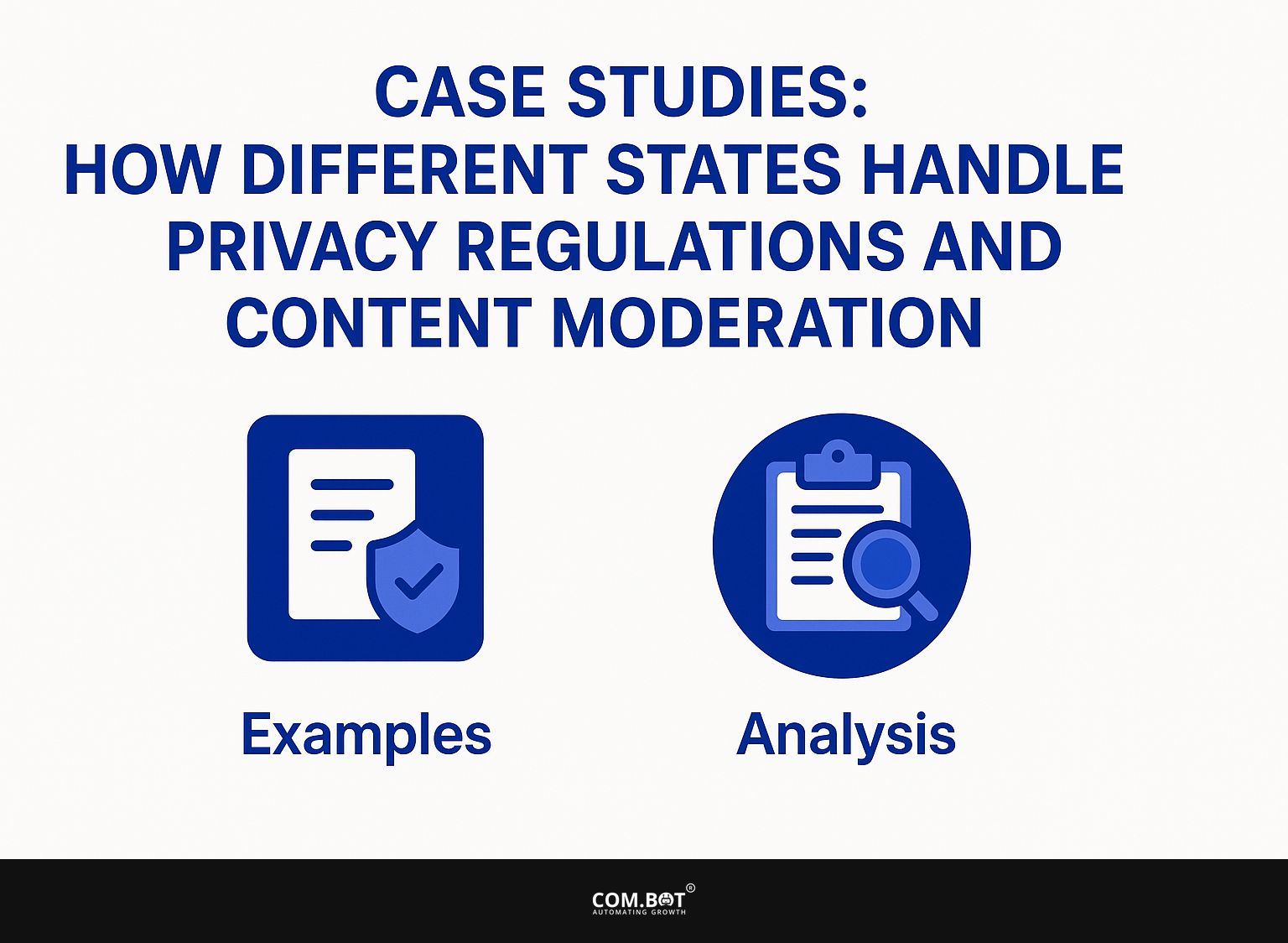
Examples and Analysis
Examples of California’s consumer privacy laws, such as the California Consumer Privacy Act (CCPA), set a precedent for stricter privacy regulations that can influence other states and even federal policies like the GDPR.
Reviewing these laws shows how organizations must change their content moderation practices to meet regulatory standards, while dealing with oversight from the FTC and advocacy groups like NetChoice. These shifts compel businesses to reevaluate their marketing strategies, emphasizing transparency and ethical data usage to build consumer trust.
As new state laws come into effect, companies might need to make sure their content moderation is consistent across various regions, making their operations more complicated. For instance, stringent content moderation laws can necessitate the allocation of additional resources, impacting budgets and innovation timelines.
As a result, brands must find their way through this complex area, managing rules while meeting the increasing demands of consumer support, which in turn influences their online presence and strategic plans.
Content Moderation and State Privacy Laws
Content moderation is set to change a lot due to new state privacy laws and improvements in AI technologies. As companies rethink their marketing plans to fit these new rules, they should also expect more examination of their content moderation methods to improve consumer privacy and build trust.
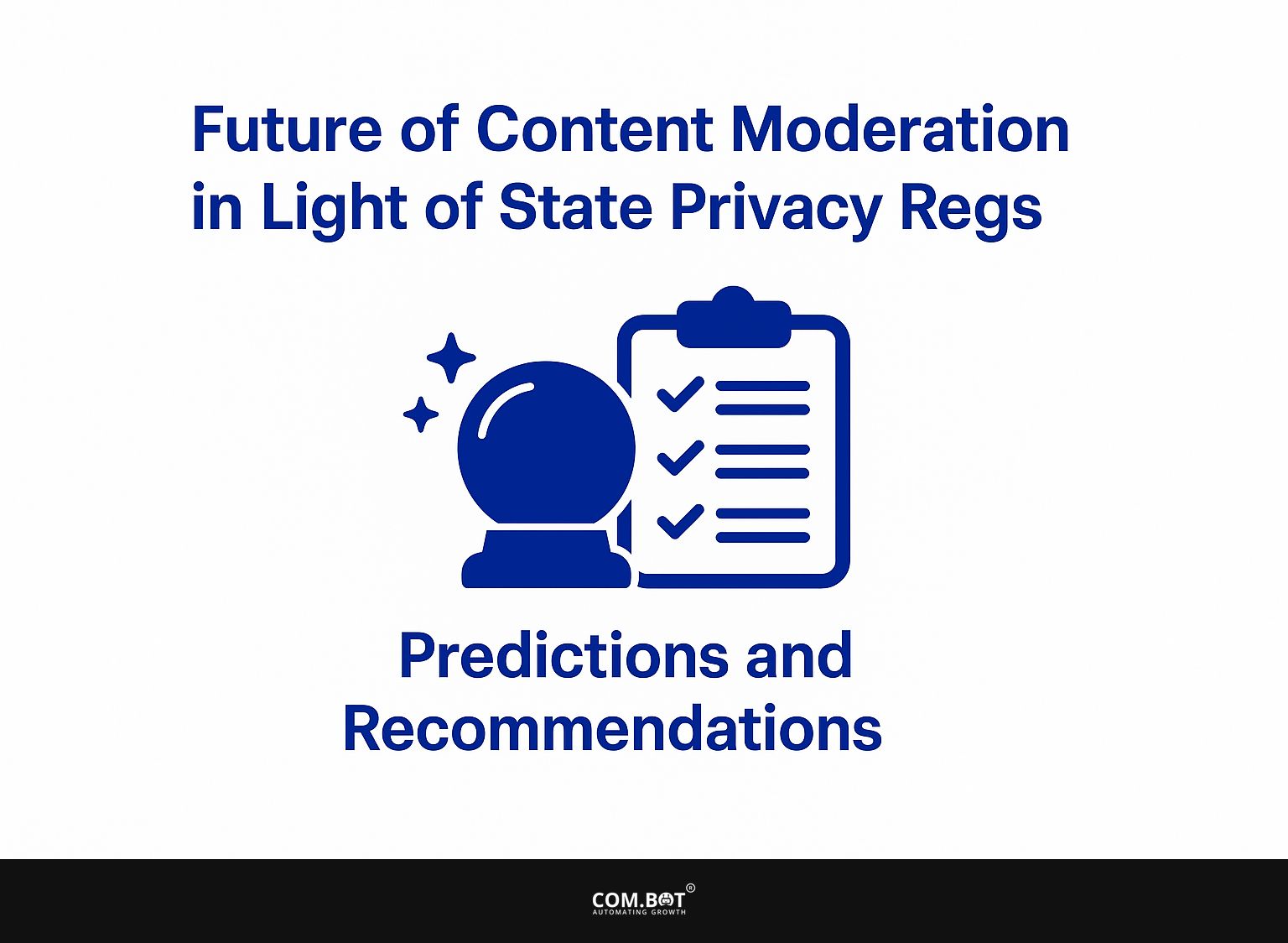
Predictions and Recommendations
Experts predict that content moderation will increasingly concentrate on meeting privacy rules, with advice recommending steps to protect users and build consumer confidence. These strategies may include implementing advanced technologies and creating transparent policies to safeguard personal data.
As rules get stricter and consumers become more aware of their online rights, businesses need to change their content moderation practices to match. Following the rules helps organizations avoid legal problems and improves their brand image.
Using artificial intelligence to watch user interactions can help spot possible security issues. Setting up clear ways for users to report problems encourages working together to keep things safe.
Building consumer trust in marketing plans needs ongoing learning about data use and privacy rules. This will help create a safer online space that puts user needs first.
Frequently Asked Questions
State-level privacy regulations are laws that are put in place by individual states to protect the privacy of their residents. These regulations can impact social media content moderation by requiring platforms to adhere to stricter privacy standards and hold them accountable for the content on their platforms.
Currently, only a few states have their own privacy regulations, such as California and Virginia. Social media platforms might face difficulties as they must follow different rules in each state, causing problems in keeping their content moderation policies uniform.
State-level privacy regulations typically require social media platforms to be more transparent about the data they collect from users and how they use it. This can impact content moderation by giving users more control over their data and potentially limiting the amount of information available for moderation purposes.
Yes, state-level privacy regulations can have an impact on how social media platforms handle user data from different countries. For example, the California Consumer Privacy Act (CCPA) applies to all users in California, regardless of their location, which can lead to complications for platforms with a global user base.
The consequences for non-compliance with state-level privacy regulations can vary, but may include penalties, fines, and legal action. In extreme cases, a platform may be banned or restricted from operating within a particular state if they do not comply with the regulations in place.
To properly manage privacy rules and content moderation, social media platforms must know the laws in each state where they work and have processes to meet these standards. This may involve implementing stricter privacy policies, increasing transparency, and investing in advanced moderation tools and resources.
